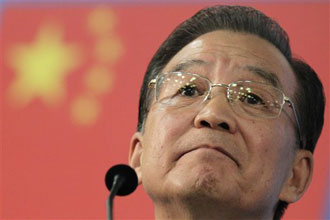Leaders of distressed economies like to direct rhetoric at a scapegoat. The ideal scapegoat has little or no political clout and is an easy target to point a finger at. Once again, China is it.
Congress and the EU leadership have taken potshots at China’s yuan policy in recent days, especially as another election cycle is coming to a head in the U.S. and European mobs are rallying over sacrifices needed to bring deficits under control. Barack Obama has pointed out that the yuan is out of balance (which it is to an extent) but has resisted joining the lynch mob lining up against China. Like most intelligent people, Obama knows that American jobs won’t be created because China appreciates its yuan. He knows that the real problem is the collapse of consumer confidence after the bursting housing bubble cost us about $16 trillion in personal wealth. He also knows that the problem ultimately will only be solved by the slow return of confidence over time though he has done what he can to speed up the process with confidence-inspiring measures.
But China is an ideal scapegoat because it is perceived as having grown rich at everyone else’s expense (which it hasn’t) and because of the flawed reasoning that says that a high yuan will make Chinese buy more U.S. goods and, therefore, create more U.S. jobs. Unfortunately, this simple-minded partial view ignores the realities of American expectations and a complex global financial system that has designated the U.S. dollar its reserve currency.
That is why, despite the fact that the yuan has appreciated by about 17% during the past five years, our trade deficit with China hasn’t grown any smaller (though it appears to be headed down as a percentage of total trade). One reason is that very few American workers are willing to spend their days on assembly lines for wages that are even four times as high as that of China’s workers. Another 10-20% appreciation of the yuan won’t change that reality. The other reason is that American consumers will continue to seek out low-cost goods no matter where they’re made. Just because we decide that a China-made product is too pricey, we aren’t going to buy a U.S.-made one. We’re much more likely to buy one made in India, Indonesia, Vietnam, Sri Lanka, Venezuela, Peru or several dozen other countries that can compete with China on labor costs.
History too teaches us that radical appreciation of the currency of our trading partner won’t help us and will only devastate the economy of that partner. Back in the early 1980s, as the Japanese auto and electronics industries became world-beaters, Americans began demanding that Japan appreciate the yen. Japan caved to intense pressure from the U.S. and Europe and began obliging. On Jan 1, 1985 a dollar was worth ¥254. Today it is hovering at around ¥83.
By caving in, Japan set the yen on a crazy upward spiral that produced a whopping 200-plus percent appreciation versus the dollar during the past quarter century. It wasn’t that Japan intended that much appreciation. It just spiraled out of control because in our interconnected global financial system, the expectation of a strengthening yen produced a self-fulfilling prophecy that overrode any conscious policy of the Bank of Japan.
Meanwhile the appreciation did nothing to help the U.S. auto or electronics industries. We no longer have a consumer electronics industry to speak of and our domestic auto brands now account for only about 47% of the cars sold here, far less than the 72% market share they enjoyed in 1985. More to the point, the number of U.S. workers making cars has been cut by 45%. To make matters worse, the uncontrolled appreciation sent Japan’s economy into a tailspin followed by a 15-year slump, further weakening its ability to absorb U.S. imports.
China has learned Japan’s lesson well and has no intention of repeating the same mistake. Yes, it will gradually let the yuan rise, as it has been doing, but it will be at a relatively glacial pace, with little predictability, to discourage the currency speculators who have essentially sapped Japan of its economic vitality during the past quarter century. Their stranglehold on Japan’s economy is evidenced by the fact that, try as it might to weaken the yen these past weeks, the Bank of Japan has been powerless to do so. Once the currency-appreciation genie is out of the lamp, it’s impossible to put it back inside.
When American jobs come back, as they certainly will, they will not be in manufacturing. Already 83% of American jobs are in the service industries. Recent data shows that sector is continuing to increase at the expense of manufacturing. Meanwhile I am fervently hoping that China won’t feel so overwhelmed by pressure from demagogues on two continents to let its currency appreciate at anything but a glacial pace. Now that China’s boom has become the global growth engine, the last thing we need is to see it sputter like Japan’s did in the early 1990s. That could set our own recovery back by another five or ten years.

